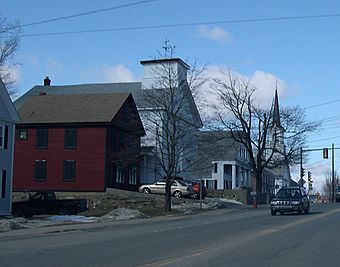Westminster Village–Academy Hill Historic District facts for kids
Quick facts for kids |
|
|
Westminster Village–Academy Hill Historic District
|
|
 |
|
| Location | Westminster, Massachusetts |
|---|---|
| Area | 92 acres (37 ha) |
| Built | 1734 |
| Architect | Multiple |
| Architectural style | Greek Revival, Late Victorian |
| NRHP reference No. | 83000612 |
| Added to NRHP | June 23, 1983 |
The Westminster Village–Academy Hill Historic District is a special area in Westminster, Massachusetts. It includes the town's very first center and a newer business area from the early 1800s. This district is found where Main Street, South Street, and Academy Hill Road meet.
You can see many beautiful old buildings here. They show different styles like Colonial, Federal, and Greek Revival. The town hall, built in 1839, is one of these important buildings. This historic district was added to the National Register of Historic Places in 1983. This means it's a place recognized for its important history.
Contents
Exploring Westminster's History
Westminster was settled in 1737 and became an official town in 1759. Its first town center was on a high spot called Academy Hill. This area had the town common, which was like a public park. Old houses, a church, and a school once stood here.
How the Town Center Moved
None of the original public buildings from Academy Hill are still standing. But you can still see many houses from the Colonial and Federal periods. The Upton School, built in 1912, was added later.
In the early 1800s, the town center started to move. A new main road, now called Main Street, was built. Businesses and new public buildings began to appear along this road. Academy Hill, however, remained a popular place for wealthier families to live.
Westminster's Growth and Change
Westminster grew a lot and had its biggest population around 1855. It became a small industrial center, meaning it had factories and workshops. It was also a busy stop for travelers using stagecoaches.
However, the town's importance changed when the railroad was built. The trains bypassed Westminster, which meant fewer travelers and less business. This caused the town's economic importance to decline.
What You Can See Today
The historic district covers a specific area of Westminster. It stretches along Main Street, from Adams Street to Academy Hill Road. The older Academy Hill area is at the eastern end. The newer town center is along Main Street.
Most buildings on Main Street show the Greek Revival style. But you can also find buildings from later times, like the Victorian era. The Forbush Library, built in 1901, and the town hall from 1829 are key buildings in the center.



